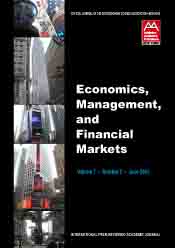ARE CURRENCY FORWARDS EFFECTIVE IN VOLATILE MARKET CONDITIONS? AN EMERGING MARKET PERSPECTIVE
ARE CURRENCY FORWARDS EFFECTIVE IN VOLATILE MARKET CONDITIONS? AN EMERGING MARKET PERSPECTIVE
Author(s): Aditya Bisen, D. Tripati RaoSubject(s): Economy
Published by: Addleton Academic Publishers
Keywords: risk hedging; futures market; derivatives; currency markets and financial risk
Summary/Abstract: Firms in emerging markets use forward contracts to hedge currency risk. Financial theory points to the usefulness of these contracts in ‘locking in’ the price payable/receivable in future, thus ensuring stable cash flows. The paper revisits these findings in the context of hedging long term currency exposure. Since forward contracts are mainly short-term instruments with maximum liquidity concentrated in one, three and six month segments, single exposures in the distant future would require roll-over of short-term contracts. While they may normally serve the purpose, emerging currencies tend to exhibit high volatility during periods of macroeconomic stress. The resulting volatility clusters stretch over long periods, making roll-over unattractive. Using forward contracts to manage multi-period exposure, as in external debt service payments, face similar problem because volatile market conditions transfer spot volatility to future earnings by way of derived volatility in forward rates. Entering into multi-period contracts in the beginning, to avoid volatility clusters, is also not possible as long term forward contracts are not available. Focus therefore, has to be on innovative currency/commodity swaps and building natural hedges to lower currency risks.
Journal: Economics, Management, and Financial Markets
- Issue Year: 7/2012
- Issue No: 2
- Page Range: 118-131
- Page Count: 14
- Language: English
- Content File-PDF

